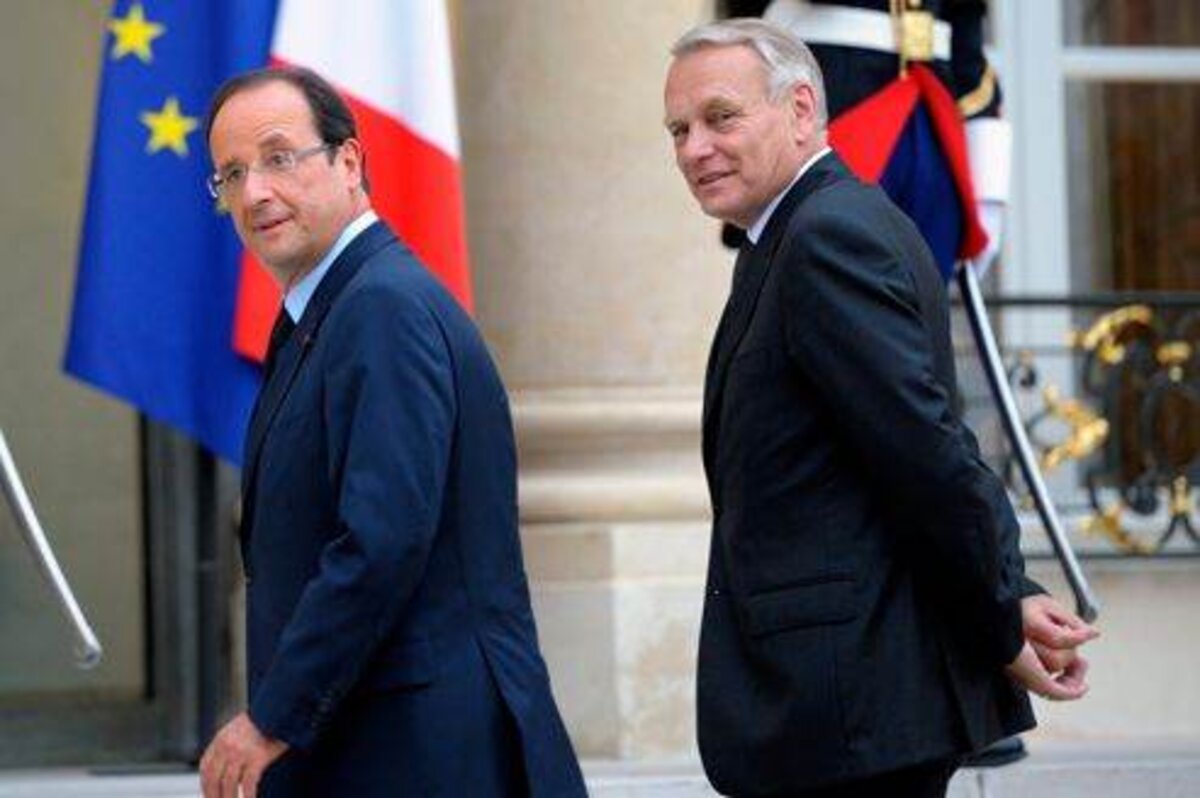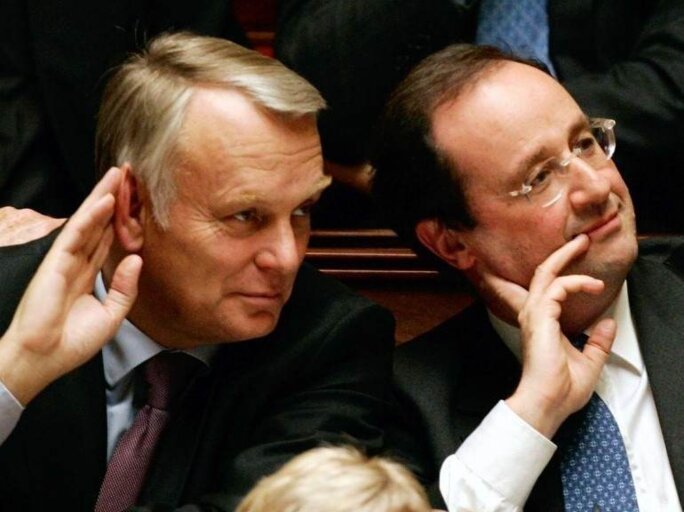The prime minister’s speech in Parliament on Tuesday outlining the government’s legislative programme will have come as a disappointment to those expecting the first cracks in the armour of an administration experiencing its first tough period. Despite question marks over the French economy and criticism over the recent rise in the minimum wage, Jean-Marc Ayrault stuck doggedly to the 60 policy proposals set out by President François Hollande during his election campaign in January. The premier punctuated his speech with the themes enunciated by Hollande, such as “change”, “economic recovery with fairness”, “trust” and “spirit of responsibility”.

This should come as no surprise. Soon after he had been named prime minister by Hollande, Ayrault spoke about his approach to government. “The first steps are very important and matter a great deal in embodying the change in direction and the manner of doing things that we want to get across,” he said.
For the moment, this embodiment is a subtle mixture of a move towards strictness and the behaviour of that of a former head of a parliamentary group – which was indeed the position held by Ayrault, who headed the socialist bloc of MPs at the National Assembly from 1997 to May of this year. The prime minister seems to want to act as the head of a majority government much as he did when he was leading the opposition in Parliament. That is to say, not at the forefront of things but as the head of a team.
For ten years Ayrault worked alongside Hollande, the former as head of the party's MPs, the latter as head of the Socialist Party (PS)(1). For a period this was under Lionel Jospin when he was the socialist prime minister under centre-right President Jacques Chirac from 1997 to 2002, then in opposition. Already their roles were in a way similar to what they are today. For one of them – Hollande – it meant positioning the socialists' general strategy, for the other it was about coordinating parliamentary action. Hollande was aiming to be presidential candidate after the party's congress at Le Mans in 2005 – before being overtaken by his then partner Ségolène Royal who became the 2007 presidential candidate – while Ayrault was being touted as the future prime minister of Royal if she were elected.
During the Hollande era of the PS, Ayrault was always the discreet but solid boss of the MPs. The two men sat side-by-side in the National Assembly chamber, two faces of pragmatic socialism in opposition. On policy content, they think the same. But while one of them, Hollande, built his career in the party – to the point of becoming a prisoner of the party apparatus which he had to leave in 2008 in order to become a presidential candidate – the other has never wanted to get involved in backroom intrigues and games.
Hollande comes across as a good chap, a politician who got elected in Corrèze having done the circuit of the local gatherings of socialist federations. Ayrault, meanwhile, is regarded as a serious man and a technician, the mayor of a city, Nantes. Now the two men run the country, each still with their own defined part to play. The roles remain the same, only the locations have changed; before it was the National Assembly and the Party, today it is the prime minister's residence Matignon and the Elysée Palace.
--------------------------
1: François Hollande was First Secretary of the Socialist Party from 1997 to 2008.
'I won’t decide everything'
A loyal supporter of François Hollande, Ayrault does not however share his skills as an orator or his humour. Some say this means he comes across as all the more reassuring and calmer - others that he is dull and boring. Could he be “a new François Fillon”, a socialist version of the previous prime minister who served under President Sarkozy? If so, there would be one very important difference. For the institutional balance that Hollande and Ayrault want – which amounts to a re-balancing after the last five years – aims to respect the separation of powers between the prime minister and the president, rather than the former allowing himself to be strung along by an interventionist presidency as seen under Nicolas Sarkozy (1).

Enlargement : Illustration 2

Rather than following the Fillon approach of not setting government policy but simply enacting it, Ayrault has been promised by Hollande that he can take back the constitutional prerogatives abandoned by his predecessor. “I will set the priorities but I won't decide everything nor make decisions for everyone. In line with the constitution the government [led by the prime minister] will determine and run the nation's policies. Parliament’s rights will be respected. The justice system will have have a full guarantee of its independence,” said Hollande.
There was no question, though, of Ayrault using a general political speech to announce a referendum on whatever subject, for example on European treaties, the modernisation of democracy or social issues. “Referendums are the domain of the president,” says someone close to the prime minister. “So one will perhaps be announced, but by the president on July 14th.”
On the other hand the Fifth Republic tradition of a presidential message that is read by the prime minister or the President of the National Assembly at the start of a new term of office – as was done by previous presidents Georges Pompidou, Valéry Giscard d'Estaing, François Mitterrand and Jacques Chirac but not by Nicolas Sakozy - has been abandoned. “There's a desire not to interfere with parliamentary activity,” explains a source in Ayrault's private office. “The president speaks to the French people, the prime minister speaks to Parliament.”
For the duo at the head of the executive there can be no turf wars over who does what, as the plan is very simple. “Everything that’s been talked about will be done. Everything that will be done will have been talked about.” This sentence, which was often repeated during the election campaign by the new occupants of the Elysée and the prime minister's residence Matignon is, strictly speaking, their road map.
Up until the point that it was delivered on Tuesday, Ayrault's outline of government policy was heralded as a “carbon copy of the campaign pledges” by the prime minister's advisers. The repeated assurances that there would be no surprises in the speech made some think that there was to be a repeat of the PR coup that took place with François Hollande's key-note campaign speech at Le Bourget near Paris in January. Downplayed in advance, it turn out to be an acclaimed address and a defining moment of his campaign. But this was not the case with Ayrault's speech.
Ayrault is not a man to create surprises, nor to wax lyrical. He represents the strict side of François Hollande's policy, while the president deals with issues of national defence or international relations or sings the praises of economic growth. “Hollande promises a country in economic recovery, and Ayrault announces the means of getting there without going via austerity,” says an MP close to Hollande.
In his own way Ayrault did want to pick up the theme of the “French dream” first evoked by Hollande at Le Bourget. So with a financial metaphor that alluded to the activities of international credit-rating agencies, he said at the end of his speech on Tuesday: “No agency will ever give a rating on our dream, the French dream, because that depends solely on your trust and depends solely on the trust of French men and women,” he said.
This question of “trust” is both a strength and main weakness of Ayrault's and Hollande's “dream”. In the current economic situation, to maintain this trust comes close to impossible. “We haven't made any unreal promises, and that's a strength, as there'll be no betrayal in relation to extravagant campaign claims,” claims a Hollande official. As for the prime minister, confidant in his own approach, he stated a month ago: “When you are clear during a campaign you are more at your ease afterwards. We won because we never changed our line, and it's by doing that that we will succeed.”
--------------------------------
1: Under France's Fifth Republic, created in 1958, it has traditionally and constitutionally been the role of the president to set the broad agenda for the government but for the head of the government – the prime minister – to set out the detailed policies and see them carried out. Under President Sarkozy prime minister François Fillon was accused of adopting a more subordinate role in relation to the interventionist president Nicolas Sarkozy, which led to the latter's style of rule being described as the omniprésidence.
--------------------------------
English version by Michael Streeter.


